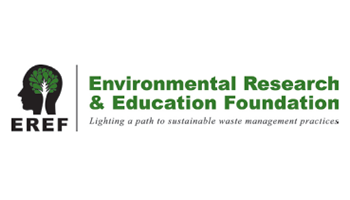 Raleigh, NC (9 January 2013) – The Environmental Research and Education Foundation (EREF) will present a Webinar entitled “Coal Ash Management and Regulations” on Tuesday, 19 February 2013 from 1:00 pm – 2:30 pm (EST).
Raleigh, NC (9 January 2013) – The Environmental Research and Education Foundation (EREF) will present a Webinar entitled “Coal Ash Management and Regulations” on Tuesday, 19 February 2013 from 1:00 pm – 2:30 pm (EST).
Coal accounts for more than a third of electricity generation in the U.S., resulting in over 130 million short tons of coal combustion residuals (CCR) annually. This makes coal ash one of the largest waste streams in the U.S. To put this in perspective, the tonnage of coal ash alone is equivalent to roughly half the total tonnage of municipal solid waste (MSW) generated in the U.S. annually. Notwithstanding an increase in natural gas supplies and a focus on renewable sources of energy, coal will feature prominently in the energy mix for the foreseeable future. The U.S. Environmental Protection Agency has recently proposed rules on how CCRs should be managed (e.g., Resource Conservation and Recovery Act, Subtitle C vs. Subtitle D) and has advocated for alternate means of CCR testing (Leaching Environmental Assessment Framework versus Synthetic Precipitation Leaching Procedure or the Toxicity Characteristic Leaching Procedure). This webinar provides a primer on CCRs as well as recommendations for their management and characterization in light of these changes.
“EREF’s Webinars are an efficient method to keep current with industry trends,” said Jo House, President of House Engineering. “This type of virtual classroom allows our industry members to further their knowledge in a convenient and cost-effective, yet still very interactive, way.”
Registration for the Webinar is $130 per person and available on the EREF Web site. A 15% discount per person for those registering 5 or more people is available by sending an e-mail to events@erefdn.org for more information. A certificate of attendance will be provided to each paid participant.and waste disposal activities. He graduated from the University of Maryland in 1987 and is a registered professional engineer in seven states including North Carolina, South Carolina and Virginia.
ABOUT THE PRESENTERS
John Daniels, Ph.D., P.E.
Interim Chair & Associate Professor, Department of Civil & Environmental Engineering
University of North Carolina – Charlotte
John Daniels is currently the Interim Chair and an Associate Professor of the Department of Civil and Environmental Engineering at the University of North Carolina at Charlotte. Previously he was a Program Director in the Directorate for Engineering, Division of Civil, Mechanical and Manufacturing Innovation and an AAAS Science and Technology Policy Fellow in the Division of Engineering Education and Centers at the U.S. National Science Foundation. He also worked for TRC Environmental Corporation, Lowell, MA as a project engineer. In 2006 he co-authored “Introductory Geotechnical Engineering: An Environmental Perspective” with H-Y. Fang. His teaching interests include waste containment, groundwater, chemical fate and transport and ground improvement. He is a registered P.E. in Massachusetts and North Carolina and holds a B.S. degree in Civil Engineering from Lehigh University, Bethlehem, Pennsylvania and a M.S. and Ph.D. in Civil Engineering from the University of Massachusetts at Lowell.
Chris Hardin, P.E.
Coal Combustion Practice Leader of Haley & Aldrich
Senior Fellow at the IDEAS Center and the Energy Production Infrastructure Center (EPIC)
University of North Carolina – Charlotte
Chris Hardin, P.E. is a geotechnical and environmental professional engineer with over 24 years of experience specializing in the technical and business management aspects of responsible waste handling, renewable energy and beneficial reuse of industrial material. He is the Coal Combustion Practice Leader of Haley & Aldrich and a Senior Fellow at the IDEAS Center and the Energy Production Infrastructure Center (EPIC) at UNC Charlotte. His experience includes the development of waste shed studies, the evaluation of beneficial reuse plans for industrial byproducts, practical research for the beneficial reuse of coal combustion byproducts, and developing guidelines for reducing carbon emissions from wide variety of construction and waste disposal activities. He graduated from the University of Maryland in 1987 and is a registered professional engineer in seven states including North Carolina, South Carolina and Virginia.
ABOUT EREF
EREF is a 501(c)3 class charity that funds and directs scientific research and educational initiatives for waste management practices to benefit industry participants and the communities they serve. Click here to learn more about EREF funded research, its scholarship program and how to donate to this great cause.











